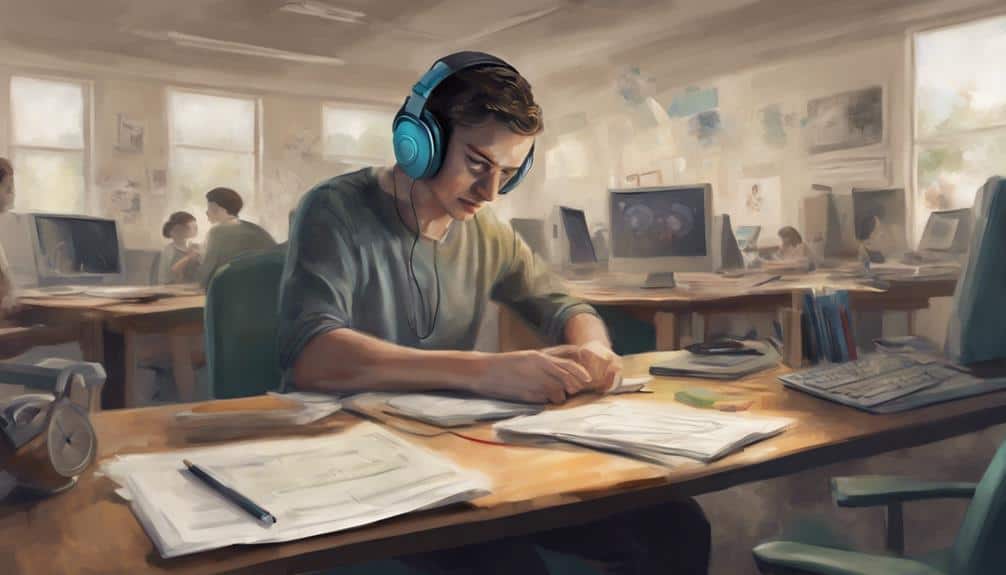Adhd Auditory Processing
As the saying goes, 'Actions speak louder than words,' I couldn't help but ponder the intricate relationship between ADHD and auditory processing challenges.
Imagine maneuvering a world where everyday sounds become a maze of confusion. How do these difficulties impact daily functioning and interaction?
Let's explore how understanding ADHD auditory processing could shed light on enhancing support systems and interventions for individuals facing these complex hurdles.
Key Takeaways
- Auditory processing challenges impact comprehension and sound localization in individuals with ADHD.
- Strategies like noise-canceling headphones and visual aids help manage auditory overload effectively.
- Communication difficulties due to auditory processing issues emphasize the need for supportive interventions.
- Implementing assistive devices, classroom accommodations, and therapy can improve auditory processing in ADHD individuals.
Understanding ADHD Auditory Processing

Understanding ADHD auditory processing involves examining how individuals with ADHD struggle to process auditory information. This struggle affects their comprehension of spoken language and ability to locate sounds. In children with ADHD, auditory processing challenges can have a notable impact on their learning and language development.
The overlap of symptoms between ADHD and Auditory Processing Disorder (APD) underscores the complexity of diagnosing and differentiating these conditions. Research indicates that individuals with ADHD often exhibit deficits in executive functioning, attention, and impulse control. These deficits can exacerbate difficulties in processing auditory stimuli.
These processing challenges may lead to increased distractibility, poor listening skills, and difficulty following instructions. These difficulties can further impede academic and social functioning. Proper assessment by healthcare professionals is essential to accurately identify and address auditory processing issues in individuals with ADHD.
Symptoms of Auditory Processing Challenges

Individuals with ADHD often exhibit distinct symptoms that point to the presence of auditory processing challenges. These challenges can manifest in various ways, impacting how individuals interpret and respond to auditory information.
Some common symptoms of auditory processing challenges in individuals with ADHD include:
- Difficulty figuring out the direction of sounds, which can lead to challenges in localizing and identifying the source of sounds accurately.
- Struggling with understanding spoken language in noisy environments, making it challenging to filter out background noise and focus on the primary auditory inputs.
- Delayed responses in conversations, where individuals may take longer to process and comprehend verbal information before formulating a response.
- Rapid speech comprehension difficulties, resulting in individuals having trouble keeping up with fast-paced conversations and processing information quickly.
These symptoms can contribute to conversation difficulties and the need for repetition in conversations, highlighting the impact of auditory processing challenges on daily interactions and communication for individuals with ADHD.
Strategies for Managing Auditory Overload

When managing auditory overload, utilizing noise-canceling headphones or earplugs in noisy environments can greatly reduce distractions.
Visual aids and written instructions serve as valuable supplements to verbal communication, enhancing comprehension and focus.
Breaking down complex auditory information into smaller, more digestible segments aids in better processing and retention for individuals with ADHD.
Noise-Canceling Headphones
To manage auditory overload effectively, utilizing noise-canceling headphones proves beneficial for individuals with ADHD and auditory processing challenges. These headphones work by reducing background noise and improving focus, making them a valuable tool in minimizing distractions and enhancing auditory focus. Studies have shown that noise-canceling headphones can enhance attention and concentration in individuals with sensory processing issues. By creating a more conducive environment for learning and productivity, using noise-canceling headphones in school or work settings can positively impact individuals with ADHD and auditory processing difficulties.
- Noise-canceling headphones can reduce background noise, improving focus.
- These headphones use microphones to pick up ambient noises and create sound waves to cancel them out.
- Studies have demonstrated that noise-canceling headphones enhance attention and concentration.
- Utilizing noise-canceling headphones in various settings can help individuals with sensory processing challenges.
Visual Aids for Focus
Implementing visual aids as part of a thorough strategy can greatly enhance focus and alleviate auditory overload for individuals grappling with ADHD and auditory processing challenges. Visual schedules, calendars, and timers play a vital role in organizing tasks and schedules, improving time management skills.
Color-coding, diagrams, and picture schedules are effective tools for enhancing comprehension and memory retention, particularly in noisy environments where auditory processing is challenging. By incorporating visual strategies alongside auditory instructions, individuals can experience improved communication, understanding, and overall learning outcomes.
Visual aids not only assist in managing auditory overload but also support individuals in managing daily tasks more efficiently, making them essential tools in lessening the impact of auditory processing difficulties on daily functioning.
Impact of Auditory Processing on Communication

Experiencing challenges in following conversations and understanding spoken language can be directly attributed to auditory processing difficulties. Individuals with auditory processing disorders may encounter various communication challenges due to the way their brains interpret sound.
Here are some key impacts of auditory processing on communication:
- Difficulty in localizing sounds: Those with auditory processing issues may struggle to determine where sounds are coming from, leading to confusion in conversations and potentially missing important information.
- Impaired background noise filtering: Filtering out background noise is important for understanding spoken language, and individuals with auditory processing disorders may find it challenging to focus on the intended speech.
- Delays in rapid speech processing: Processing quickly spoken words can be overwhelming for those with auditory processing difficulties, resulting in delays in responding and potential misunderstandings.
- Increased repetition requests: Individuals may frequently ask for repetitions in conversations, as they struggle to comprehend complex auditory information the first time.
Effective communication strategies, such as minimizing background noise and utilizing visual aids, can greatly aid individuals with auditory processing disorders in improving their communication skills.
Supportive Interventions for ADHD Auditory Processing

Challenges in auditory processing for individuals with ADHD can be effectively addressed through targeted supportive interventions. Assistive listening devices play a vital role in enhancing sound clarity for individuals with ADHD auditory processing disorders. Implementing classroom accommodations like preferential seating can greatly aid in mitigating auditory processing challenges in individuals with ADHD.
Speech-language therapy is a valuable intervention for improving auditory processing skills in individuals with ADHD, helping them better comprehend and respond to auditory information. Providing breaks during tasks involving auditory processing can assist individuals with ADHD in managing their attention and focus more effectively. Additionally, utilizing visual aids and cues alongside verbal instructions can enhance the processing of auditory information for individuals with ADHD.
These supportive interventions are key in creating an environment that fosters improved auditory processing abilities in individuals with ADHD, ultimately enhancing their overall communication and learning experiences.
Enhancing Learning Environments for ADHD

Enhancing the learning environment for individuals with ADHD involves strategically incorporating structured routines and visual schedules to optimize their academic success. As someone who's researched extensively in this area, it's evident that tailored interventions can have a major impact on the educational experience for students with ADHD.
Here are key strategies to enhance learning environments for individuals with ADHD:
- Clear Instructions: Providing concise and visual instructions can enhance understanding and focus for students with ADHD.
- Preferential Seating: Best seating arrangements near the teacher and away from distractions can improve attention and engagement in classroom settings.
- Movement Breaks: Incorporating scheduled movement breaks supports sensory needs and can help regulate individuals with ADHD.
- Sensory Tools: Utilizing fidget toys and other sensory tools can provide necessary stimulation and aid in maintaining focus during learning activities.
Frequently Asked Questions
Does ADHD Affect Auditory Processing?
Yes, ADHD can impact auditory processing, affecting cognitive functions, attention span, and communication skills. Individuals may experience hearing difficulties, learning challenges, and behavioral issues. Sensory integration plays a role in how treatment options can address these issues.
What Are the 4 Types of Auditory Processing Disorder?
The four types of Auditory Processing Disorder (APD) are auditory discrimination, sound localization, auditory figure-ground, and auditory memory. These encompass challenges with understanding sound differences, focusing in noise, and recalling auditory information.
What Does Auditory Processing Disorder Look Like in Adults?
Auditory processing disorder in adults can present as difficulty in noisy environments, understanding rapid speech, and localizing sounds. This can impact communication skills and social interactions. Strategies include therapy, workplace accommodations, and self-care practices.
What Are the Coping Skills of Someone With Auditory Processing Disorder?
When dealing with auditory processing challenges, I focus on managing noise sensitivity, using effective communication strategies, minimizing sound distractions, combating listening fatigue, enhancing speech comprehension, adapting the environment, engaging in multisensory learning, preventing cognitive overload, and improving social interactions through technology solutions.
Conclusion
Addressing ADHD auditory processing challenges is essential for individuals with ADHD to thrive in auditory tasks.
Just like a musician tuning their instrument for the best performance, providing support and interventions can help individuals with ADHD enhance their auditory processing skills.
By recognizing and managing auditory overload, improving communication strategies, and creating supportive learning environments, we can empower individuals with ADHD to navigate the auditory world with confidence and success.







